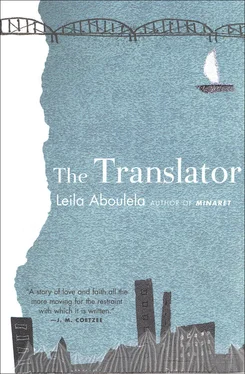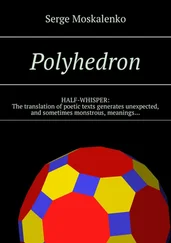He got up from the bed slowly. She saw that he was wearing socks, odd colours, one navy and one black. He bent down and pulled a suitcase from underneath the bed. He opened it and started to pull out from it clothes, what looked like his laundry, a jumble of books and tapes.
‘I am usually more organised than this,’ he said.
Sammar had to bite her lips to stop herself from offering to take his laundry home, wash his clothes for him. She wanted to fold them, smooth them out, align the sleeves together, sort them into piles.
‘Can I look at your tapes? Is this what you listen to in the car?’
He nodded and went on searching his suitcase. She recognised some of his tapes, Bob Marley’s Survival, Babylon By Bus, Uprising. He drove around Scotland listening to reggae; the call for Africa to unite… ambush in the night… we’ll be forever loving Jah. The words came back to her with their tunes… Emancipate yourselves from mental slavery, none but ourselves can free our minds… Where had she heard these songs? Back home, in the petrol queues of Souk 2, from the radio of a Toyota pickup, the cars bumper to bumper, the whole queue like a segmented snake burning under the sun. The smell from the bakery mixed with the smell of oil, and petrol fume addicts squatting near the fuming pumps, beggars leaning on the cars, thrusting their fingers through the windows. There were the songs and here in this cold city Tarig bought the tapes from a shop on Union Street, for the ones back home had long ago melted in the sun. Look out at the dark rain, hope that Tarig was doing well in his exam and teach Amir to sing, Sun is shining, the weather is sweet…
She held one of the tapes in her hand, opened and closed the box. Flags of Africa on the cover, green, so many of them green. Reds, blue, crescents and stars, a torch held up high. In her own hospital room, on good days, she had played that same tape, someone telling the truth, by the power of the Most High we keep on surfacing.
‘I got you this from Edinburgh,’ said Rae.
It was wrapped in light-blue paper, square shaped, a little box. He began to put his things back into the bag, slowly but carelessly stuffing them away.
She unwrapped the present, careful not to tear the paper. It was a bottle of perfume, oval shaped, with a stopper not an atomiser, liquid the colour of amber. She had thought all the time he was looking in his bag that he was going to give her the Azhar thesis he wanted her to translate. She said, ‘Thank you,’ and opened the bottle. The scent was neither fresh nor spicy but heavy and sweet. ‘It smells nice,’ she told him, even though she knew that this was not the way to judge perfume, she should first rub it on the inside of her wrist, wait for it to settle. But she could not do that now and looking up she saw that he was as embarrassed as she was.
He said, still kneeling on the ground putting his bag away, ‘The man who sold it to me was French. He said, this perfume is new, it’s the best, it’s come from Heaven via Paris.’
She laughed, ‘What a funny thing to say, from Heaven via Paris.’
He looked tired when he stood up, sat down again on the bed. She said, ‘I should go now, you look tired.’
He shook his head. ‘No please stay. It’s just that standing up suddenly made me dizzy. Stay, I want to talk to you.’
She folded the gift paper and put it away with the perfume inside her handbag. She took out her aunt’s letter. ‘Look what my aunt wrote as the address. “Aberdeen, England” and someone at the postoffice went over England in red ink.’
‘You have just won me to your side, Sammar, in any quarrel you’ve had with your aunt. Aberdeen, England, is unforgivable.’
‘That’s what they must have thought at the post office. It’s a good thing they delivered it.’
‘When I was in Cairo,’ he said, ‘I was often asked, are you English, Ingelizi? and I would say, No. Amrikani? No. Then they would start getting suspicious. I’d say Scottish and they’d say, Oh, is that where the war is?’
‘Scotlandi,’ she said. ‘You should say, Ana Scotlandi mish Irelandi.’
‘Tell me before I forget,’ he said, ‘what does shirk al-asbab mean? I know that shirk means polytheism.’
‘ Asbab are causes, intermediaries, so shirk al-asbab means the polytheism of intermediaries. For example to believe in Nature, to elevate Nature which is only an intermediary and set it up as a kind of partner to God. Where did you come across it?’
‘Fareed.’
‘Is he the one you met in Stirling?’
‘Yes. He’s going to be coming to Aberdeen later this month to teach part of my course. You’ll meet him then. I spoke to him about you.’
She wondered why he had spoken about her, how he put her into words.
‘Where is he from, originally?’
‘He came here from Lebanon. But he is originally a Palestinian from Gaza. He was a journalist and he was imprisoned by the Israelis for some time. They gave him a rough time, a real rough time.’
She said, ‘Have you been to Gaza or Lebanon?’
‘No.’
‘My aunt went to Beirut long ago, before all the troubles. She bought me so many things.’ Her aunt had brought her a T-shirt with a round yellow smiling face, a doll that could walk. ‘I forgot I haven’t even opened her letter.’
She wanted to read the letter now so that his presence could cushion the inevitable hurt.
The letter was brief, with an attached list of things that her aunt wanted her to bring. Items from the pharmacy: paracetamol, laxatives, biscuits for diabetes. Also Hanan had just had a baby and seemed to need the whole of Mothercare. Then there were things for Amir: clothes, roller blades. Roller blades? How did they find out about things like that? Sammar put the list of orders back into the envelope, it was too daunting. Her aunt must imagine that she was making millions, an expatriate like those who found jobs in Saudi Arabia and the Gulf. The letter itself was breezy, ‘I am so proud that you got this job to go to Egypt, wonderful that they are going to pay for your ticket! This is the right thing, as I’ve said before, to concentrate on your career and your son. It will be good for him to be in England with you, good for his education. So many envy you.’ This was followed by a torrent of complaints about life in Khartoum and how awful Sammar would find it after being away for so long. Then the last lines: ‘I am so glad you seem to have got rid of this ridiculous idea of getting married again — when you see Amir, how lovable he is, you will not have the hard heart to be so selfish and bring him a stepfather, some stranger who will not treat him well. Of course it doesn’t matter where you are, no one is seeing you there but when you come, it would be better not to wear so much colour, you know how people get ideas. You don’t need to get everything that Hanan has asked for, she wants too much as usual, but my pharmacy things be sure to bring them.’
Sammar smiled weakly at Rae. She wanted to speak but couldn’t.
‘So what is the news?’ he said.
‘My aunt thinks that Amir would like roller blades.’
He said that Mhairi had roller blades and went on to talk about children’s toys. She listened to his voice but not what he was saying.
‘My aunt thinks that after living here for so long, I will hate it when I go back to Khartoum. She thinks I will see everything as ugly and backward.’
‘I don’t think you will see everything as ugly and backward. What do you think?’
‘I don’t know.’
‘Your aunt doesn’t know you,’ he said.
‘She’s known me for most of my life!’ She pretended that she did not agree with him while inside her she was thrilled by what he had said. She had wanted him to cushion the hurt from the letter and he had done more than that, effortlessly, easily, as if by magic.
Читать дальше












